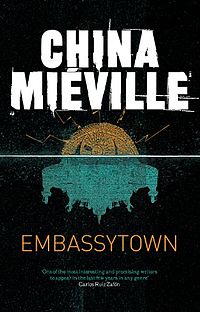I’ve heard of China Miéville from his work in other genres but this is, I believe, his first science-fiction novel, and the first book of his that I’ve read. Embassytown received some very impressive reviews so I delved into it with plenty of anticipation and not a little bit of trepidation. As it turned out, the novel is less ambitious and more traditional than I expected so I needn’t have worried myself.
As its title implies, the book is about a city called Embassytown, the sole human settlement on the alien planet of Arieka. In the universe created by Miéville, humans traverse interstellar space by going through something called the immer, while hinting that some aliens, called exots, have wholly incompatible forms of FTL technology. It so happens that Arieka is located just about at the edge of explored space in the immer. This means that while Embassytown is formally a colony of a human empire known as Bremen, it is de facto semi-autonomous due to its remote location so visits from spacecraft crossing interstellar distances, called voidcraft, are both rare and the occasion for grand celebration.
What makes Arieka extra special are its native sentients. They are the Ariekans of course, but the inhabitants of Embassytown, having been inculcated with a strong sense of respect for them since young, never call them that. They instead call them the Hosts. The Ariekans do not possess starfaring technology. Instead their entire civilization is based on biological technology, called biorigging. Energy for example is generated by literal power plants, huge bio-engineered things that presumably absorb sunlight and perhaps consume nutrients. Even houses, weapons and flying transports are all living creatures that appear to share some of the Ariekans’ own DNA. As a cunning trick, Miéville never actually describes the Ariekans in full. They are larger than humans certainly, have giftwings instead of arms and seem to possess both insect-like and bird-like features, but we never get a complete picture of what one looks like. This allows the Ariekans to remain suitably mysterious and alien throughout the book.
But the most interesting thing about the Ariekans is their language, or rather their Language, because they have only one. They possess two mouths which must speak simultaneously to articulate words in Language, so single humans cannot speak Language without assistance. But to the Ariekans, Language is more than just language. It is reality. It is truth itself. As such the Ariekans are incapable of lying. They must believe that something is literally true before they can speak it, perhaps before they can even think it. While it is possible for machines for example to create the two simultaneous sounds that constitute a word in Language, the Ariekans are also incapable of understanding it unless the two sounds are generated by a single, unified, sentient mind.
Over time, the humans have learned to breed special human Ambassadors to communicate with the Ariekans, pairs of genetically-identical twins who are trained to think alike from birth and whose minds are linked with special electronics. So while any human with suitable training can understand Language, only the Ambassadors can speak Language in such a way that the Ariekans can comprehend it. But one day a pair of Ambassadors arrive from Bremen whose minds are not identical and yet the Ariekans can somehow comprehend what they say. It is this impossible Ambassador that starts the main plot of the book rolling.
The story is told from the point of Avice Benner Cho, a girl born in Embassytown, but who having discovered she has the relatively rare ability to withstand and make sense of the immer, becomes an immerser, a crewmember of a voidcraft and spends time travelling in the Out. Eventually she comes home again in time for the events that will change Embassytown forever. This choice of a POV character allows Miéville to tell his story from the perspective of both an outsider and an insider.
As you might guess from the many terms in italics in this post, the author delights in inventing florid new terms. This adds strangeness and freshness to the novel, even though they are just new names for familiar concepts in science-fiction. There also some subtle themes going on, for example as exemplified in the character of Ehrsul, a robot running on so-called turingware that other characters treat as a mere pretence of sentience but the POV character somehow accepts as her best friend.
But while one may hope that the ideas about the Ariekans’ Language might result in some general insight about the nature of all languages and sentience, that is not the case here. This is very much a case of a specific alien having a specific problem that the humans must reason about and ultimately solve. Personally I found this unambitious and extremely disappointing.
In the end, Embassytown is well-written space opera, with an original conceit, rich themes and excellent worldbuilding. But it goes nowhere with its key new idea and Miéville depiction of the Ariekans remains well short of more interesting aliens such as the Moties of The Mote in God’s Eye. I’d still recommend it wholeheartedly. I just don’t think it quite lives up to the high praises it has earned in many reviews.

One thought on “Embassytown”